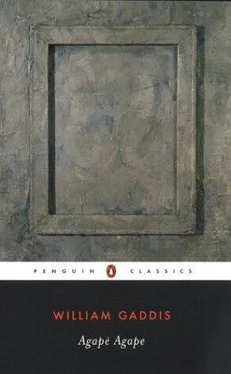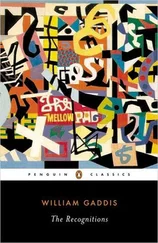Joseph Tabbi
Agapē Agape is William Gaddis’s swan song, his most concentrated fiction, and the one work where he risks a direct address to the reader. The distillation of a project that occupied him throughout his professional life, this final fiction began as an exhaustive social history of the player piano in America, whose lineaments can be read in the thousands of notes, clippings, working papers, drafts, and snippets that Gaddis left at his death. Organized roughly, like all of his manuscripts and background materials, into numbered cardboard boxes, the remains of his research match the narrative description: among the working papers, one finds a chronology from the player’s invention in 1876 to 1929, “when the player piano world and everything else collapsed.” Handwritten reminders, in a hand whose changes can be discerned over half a century, appear in the margins, or on whatever scraps of paper he had around. “Chaos theory as a means toward order,” reads one note among the strips and folders that Gaddis would refer to when composing his last work. After a career spent imagining in detail the vast systems and multiple voices of an emerging global culture — in works that have themselves been called “systems novels”1—Gaddis at the end would reflect primarily on his own private system of assembling materials and putting words down on paper.
As with all of his books, for Agapē Agape much of the working material was cut out from popular magazines and newspapers. (Even the high literature, art, music, and technology references that made him seem forbiddingly “erudite” to some readers often came out of daily papers, or this material was sent to him by acquaintances; possibly more came to him this way than from books.) Often, Gaddis would combine strips on a single topic or under a single date and tape them all the way along one side, on a single long page. When correcting galleys and typescripts, he would insert words and small phrases by hand, but he preferred to lay in new material in typed strips cut with scissors. Composition, for Gaddis, was a distinctly material practice, involving a literal organization and arrangement of found materials, even as his narrator struggles literally to hold himself together. In a sense, the writer becomes the page on which he’s writing: the wreck of an old man in Agapē has rusting staples in his legs, and his skin is like tissue paper from the drugs he’s been taking. He worries that his books will be left on the shelf, unread, while his unpublished research molders in the boxes stacked around him. But as long as he goes on reading, revising, adding to the manuscript, he will stave off death and madness and keep the work from becoming “what it’s about”: entropy, chaos, loss, and a mechanized culture indifferent to the cultivation of particular, individual talents.
This is the theme he would come back to, obsessively, in the very last working papers and at the last page of Agapē: “Discover yr hidden talent,” “yr unsuspected talent,” “disc secret talent” all appear on one page of notes, along with “the self who could do more” (three times, with variations). The notetaking evidently continued weeks and months past the time when he’d declared the manuscript finished — confirming a lifelong habit he had of writing past a book’s end. That’s how it went with The Recognitions, which Gaddis completed half a century before, when he still had on his desk pages of “outlined notes. . for spinning out the novel’s conclusion” (letter to Steven Moore, April 7, 1983). And the succeeding books each took off, in their turn, from the leftover drafts of work that preceded it until, at the end of his life, Gaddis determined to transform his accumulated research into one gemlike meditation without false illusions or consolations.
The player-piano history, had it been completed, would have been an impressive coda to the fiction. As scholarship, it would have put Gaddis belatedly in the tradition of those North American writers on media and technology — Lewis Mumford, Elizabeth Eisenstein, Marshall McLuhan, and Neil Postman — who could perceive technology’s aesthetic consequences and wellsprings. As literary criticism, much of what Gaddis intended had already been accomplished by Hugh Kenner in The Counterfeiters. As a conceptual work, the history could scarcely have rivaled Walter Benjamin’s “Work of Art in the Age of Mechanical Reproduction.” Gaddis knew this; he knew that his contribution to the study of mechanization and the arts had already been accomplished, indirectly, with his novels. But the accumulated research of half a century weighed on him during these final years, demanding an outlet. He worked hard on the history through 1996 and early 1997, when he discovered that he would not have long to live. By that time, however, he had already decided to re-format the work as a fiction, having finally realized that his own raillery on the subject was more interesting to him than “a dim pursuit of scholarship headed for the same trash heap I’m upset about in the first place.”2
Once he had finally set aside the history, Gaddis used his boxes of snippets to create a character who had an obsession identical with his own, whose lived experience and efforts at composition could dramatize both the possibilities and “the destructive element” within an emerging technological order. Later, in 1998, when he was commissioned by DeutschlandRadio to write a play suitable for broadcasting, he responded with a fragment unlike anything he — or anyone else — had ever written: a one-act monologue entitled Torschlusspanik (the fear of doors closing, of opportunities lost, of staying single, and — not least — of going unread). The work was translated and broadcast on March 3, 1999, three and a half months after Gaddis died. At his death, a somewhat longer typescript of eighty-four pages, intended by Gaddis for posthumous publication, was sent to his agent under the same title he had used for the history: Agapē Agape. His last words sound and read less like a deathbed utterance than a posthumous one, from beyond the grave — less a lament, finally, for his own passing than an honest expression of fear at where technology is taking the world.
A Secret History of Agapē Agape
The voice Gaddis found for his last fiction is unique but not without literary precedent. In the early nineties, Gaddis had discovered the works of Thomas Bernhard, and he sensed in this near contemporary from Austria not only personal affinities but a model for his reconceived project, a minimalism that allowed him to transform (rather than abandon) his accumulated research. The shift from scholarship to fiction would be accomplished by giving musical form to the work itself. Rather than reiterate music history, Gaddis would invite the reader to experience the work’s musicality; his life-work would be understood not by following his labor and his logic, but through listening to his voice and its several modulations. Bernhard’s musicologist in his novel Concrete, writing a biography of Mendelssohn-Bartholdy, aims at a “major work of impeccable scholarship” that would leave “far behind it and far beneath it everything else, both published and unpublished,” that he had ever written.3 Gaddis at a high moment may have felt the same about his player-piano history; most of the time he more likely suspected that his research would ultimately be left to “some beleaguered doctoral candidate”—as he said to me in a letter of 1989.
The Loser and Concrete are not only cited by Gaddis; they provide narrative models, or, as Gaddis’s narrator would say, plagiarisms in advance, “like my own ideas being stolen before I even had them.” Bernhard’s subjects were Gaddis’s subjects also — musicology, home-state excoriation, and Glenn Gould as the hidden talent who could do more than his fellow students, Wertheimer and Bernard’s narrator in The Loser, causing both of them to give up piano playing. Also, the brevity of Bernhard’s work was made to order for Gaddis’s reformatted fiction — this and the single narrative voice capacious enough to express subtle shifts in mood and occasional surges. More specifically still, this stripped-down style was consistent with the effects of prednisone — the drug that both Gaddis and Bernhard had taken for relief from emphysema. To his son Matthew, Gaddis would recall waking up singing after his first use of the drug, and its jag is consistent with the peculiar pacing of the narrative he left us — its meandering, hallucinatory quality that suddenly comes to a focus on one particular object, one item within the field of vision capable of absorbing attention and momentarily freeing the body from pain and breathlessness.
Читать дальше












